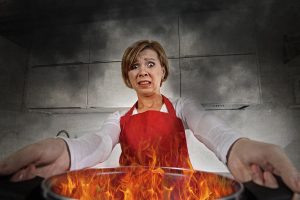Usually, when a fire starts in the kitchen, you automatically assume it’s due to a cooking hazard. A skillet goes unattended for too long or the toaster malfunctions and a flame ignites. Although there are many instances where cooking or cooking appliances are the main causes of kitchen fires, there are certain circumstances where fires are perpetrated by non-cooking appliances, like the refrigerator or dishwasher. There are several tips you should keep in mind in order to avoid a fire that may start in the kitchen with appliances that generally are not used for cooking.
- Do not use extension cords. Refrigerators, dishwashers, and freezers should be plugged directly into the wall outlet. Using an extra extension cable can overwhelm the circuit and eventually a spark could develop.
- Use grounded outlets for large appliances. If you did not already have one, have an inspection made of your outlets to make sure that they are grounded. A lightning storm could easily attack a unit that is not properly grounded, causing a kitchen fire.
- Get rid of damaged power cords. Overtime you should replace power cords that have become visibly frayed. Small drops of water on exposed wiring can lead to a disastrous outcome. Buy cords for your recommended refrigerator or freezer. Have the make and model handy when you go to the home improvement store.
- Be aware of grease buildup. Ovens and stoves harbor grease that can buildup overtime and easily cause an unexpected fire. Many modern ovens come with a self-cleaning feature and should be used regularly. If you must hand clean your oven, use a cleanser that is not abrasive and won’t leave a layer of residue.
- Flammable liquids should be kept outside. Do not place any materials that are flammable, including dishtowels, near a gas range’s open flame or a stove’s surface. You should keep all other items, like lighter fluid, alcohol, or nail polish in the bathroom or garage.
- Small appliances can be a fire hazard. You should unplug any small appliance when it is not being used. Not only will you save energy, but you can also prevent an unnecessary hazard. Also, check the consumer government website to see if your small appliance has not been recalled. There are many dangers in using an electrical item that is not safe.
- Do not use the oven as a heater. It is not a good idea to leave the oven door open in order to heat your home. According to the Center for Disease Control and Prevention, heating your home with a gas range or oven can cause a rise in carbon monoxide or CO levels. CO is an odor-free gas that can kill anyone.
Anytime there is a fire in your kitchen, you should call 9-1-1 first. Fires can rage quickly and consume your home in an unpredictable way. Typically, kitchen fires contain grease, so dumping a bucket of water over it will not extinguish it. A fire extinguisher will come in handy in this situation, so have one beneath the sink or in a nearby pantry.

